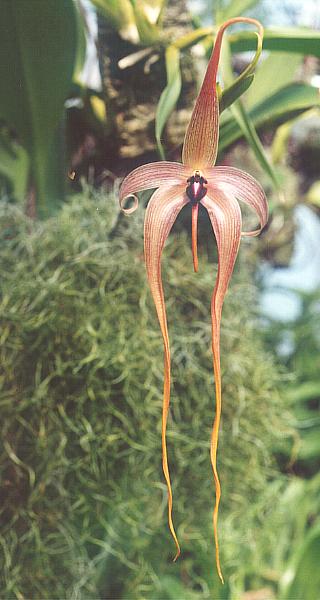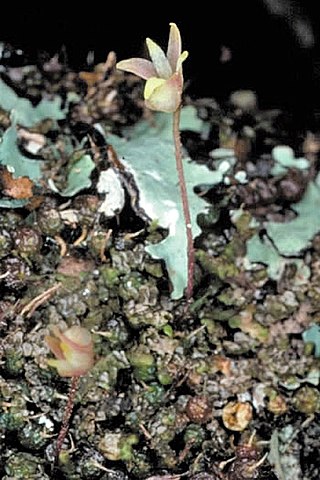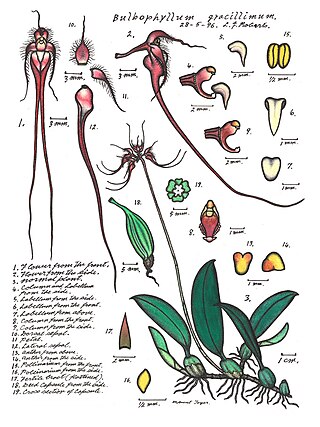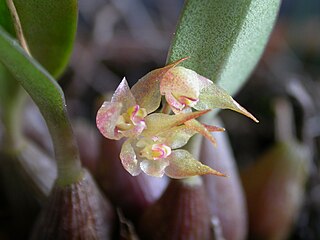
Orchids are plants that belong to the family Orchidaceae, a diverse and widespread group of flowering plants with blooms that are often colourful and fragrant. Orchids are cosmopolitan plants that are found in almost every habitat on Earth except glaciers. The world's richest diversity of orchid genera and species is found in the tropics.

Bulbophyllum is a genus of mostly epiphytic and lithophytic orchids in the family Orchidaceae. It is the largest genus in the orchid family and one of the largest genera of flowering plants with more than 2,000 species, exceeded in number only by Astragalus. These orchids are found in diverse habitats throughout most of the warmer parts of the world including Africa, southern Asia, Latin America, the West Indies, and various islands in the Indian and Pacific Oceans. Orchids in this genus have thread-like or fibrous roots that creep over the surface of trees or rocks or hang from branches. The stem is divided into a rhizome and a pseudobulb, a feature that distinguished this genus from Dendrobium. There is usually only a single leaf at the top of the pseudobulb and from one to many flowers are arranged along an unbranched flowering stem that arises from the base of the pseudobulb. Several attempts have been made to separate Bulbophyllum into smaller genera, but most have not been accepted by the World Checklist of Selected Plant Families.

Bulbophyllum globuliforme, commonly known as the green bead orchid, miniature moss-orchid or hoop pine orchid, is a species of epiphytic orchid with tiny spherical pseudobulbs, scale-like leaves and small cream-coloured flowers with a yellow labellum. It grows on the scaly bark of hoop pine, mostly on the McPherson Range on the New South Wales/Queensland border in eastern Australia. Because of its small size it is often dismissed as moss.

Bulbophyllum fletcherianum, the tongue orchid, Fletcher's bulbophyllum or Spies' bulbophyllum, is a rare orchid native to southern New Guinea. It prefers sunny rock outcrops or mossy tree branches, but besides being lithophytic or epiphytic, it can also be pseudo-terrestrial. The tongue orchid requires high humidity and moist roots.

Bulbophyllum biflorum is a species of orchid. This species was found in Java, Sumatra, Bali, Borneo, the Philippines, and the Thai and Malaysian peninsula. The flower size is 7.5 cm long.
Bulbophyllum abbreviatum is a species of orchid in the genus Bulbophyllum discovered in Madagascar and originally described by German botanist Rudolf Schlechter, from material collected by French botanist H. Perrier de la Bâthie in February 1912, which is now kept in the Muséum National d'Histoire Naturelle in Paris.

Bulbophyllum amplebracteatum is a species of orchid in the genus Bulbophyllum.

Bulbophyllum apodum is a species of orchid in the genus Bulbophyllum. It bears a 12–14 cm inflorescence with around 40 small fragrant white flowers on it. It is native to Sikkim, Borneo, China, Malaysia, Thailand, the Philippines, Vanuatu, and Vietnam.
Bulbophyllum betchei is a species of orchid in the genus Bulbophyllum.

Bulbophyllum cheiri is a species of orchid in the genus Bulbophyllum.
Bulbophyllum cylindrobulbum is a species of orchid in the genus Bulbophyllum. They are commonly found in New Guinea and in the Solomon Islands.

Bulbophyllum gracillimum, commonly known as the wispy umbrella orchid, is a species of epiphytic orchid. It has a creeping rhizome, widely spaced, olive green pseudobulbs, each with a single thick, leathery, fleshy leaf and between six and ten purplish red flowers spreading in a semicircular umbel. The flowers have distinctive long, thread-like tails on the lateral sepals. It has a wide distribution and is found in New Guinea, New Caledonia, Indonesia, Malaysia and part of tropical North Queensland.

Bulbophyllum moniliforme is a species of orchid in the genus Bulbophyllum. It is indigenous to the Assam region in eastern India.

Bulbophyllum odoratum is a species of orchid in the genus Bulbophyllum.

Bulbophyllum ovalifolium is a species of orchid in the genus Bulbophyllum.

Bulbophyllum scabratum or Rough Bulb-Leaf Orchid is a species of orchid in the genus Bulbophyllum in section Eublepharon.
Bulbophyllum unguiculatum is a species of orchid in the genus Bulbophyllum. It is commonly known as the clawed bulbophyllum. It is found in Sumatra, Java, Borneo and Sulawesi in lower montane forests.
Bulbophyllum nocturnum is a species of epiphytic orchid that grows in New Britain. It was described in 2011, and is the first species of orchid known to consistently flower during the night, and close its flowers during the day.

Dendrobieae is a tribe in the subfamily Epidendroideae, in the family Orchidaceae. The Dendrobieae are mostly tropical, epiphytic orchids which contain pseudobulbs.
An attractant is any chemical that attracts an organism, e.g. i) synthetic lures; ii) aggregation and sex pheromones ; and iii) synomone













